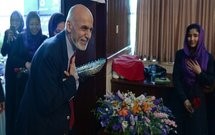 On 21 September 2014, the Independent Election Commission (IEC) of Afghanistan declared Ashraf Ghani Ahmadzai as the winner of the country’s presidential election that took place earlier this year, after a lengthy deal-making process with the other leading contender, Abdullah Abdullah.
On 21 September 2014, the Independent Election Commission (IEC) of Afghanistan declared Ashraf Ghani Ahmadzai as the winner of the country’s presidential election that took place earlier this year, after a lengthy deal-making process with the other leading contender, Abdullah Abdullah.
What does the creation of ‘Chief Executive Officer’ (CEO) mean for Afghanistan? Does the end of the political deadlock automatically spell good times for the country?
Deal-making and the Emergence of the Unity Government
The 2014 Afghan presidential election – the first transfer of power to a whole new leadership – was precariously prolonged and fraught with several strong opposing stances and allegations. After the tense flux and indecision that followed the elections, which led to an UN-overlooked and US-funded audit of the ballots, the results were finally declared three months after the run-off concluded. The IEC declared Ashraf Ghani as the president-elect, and runner-up Abdullah Abdullah as the CEO – a post that was created to facilitate power-sharing and to end the electoral deadlock.
The IEC and the candidates simply announced the results without declaring the vote statistics. In fact, the deal-making between Abdullah and Ghani that took months to finalise, ended on the condition that the vote statistics won’t be made public.
This does not bode well for a country that is on its path towards democracy after years of civil war and strife. A decision on the leadership was extremely pressing and the Sunday announcement comes as a relief for the political stability of the country at the moment. However, the means to reach that end was not ideal, and has potential to lead to problems in the future. The decision for deal-making was agreed upon and took place between the parties and the declaration of results were stalled and delayed due to intransigence on the part of the contenders, thereby making the candidates and not the IEC the real decision-makers. The deal-making between the candidates undermines the credibility and significance of the IEC – which emerged as a toothless tiger. It indicates the lack of authority on the IEC’s part to ensure the writ of the state – in terms of election processes as mandated by the constitution of Afghan state – as it is supposed to do. This points towards the urgent need for reforms in the IEC and other state institutions – especially given how the 2015 parliamentary election is fast approaching.
An Assessment of the Election Process
An interesting trend that emerged over the course of the electoral process was the blending of Afghan cultural characteristics with the concept of democracy. Negotiations – an extremely prominent aspect of the Afghan culture – continually took place between various players during various stages of the polls. This demonstrates to an extent the adaptation of the concept of democracy into the pre-existing Afghan system.
At present, the president is the head of the government, and the constitution does not include space for a prime ministerial post. According to the National Unity Government Agreement, until such time as the post of a prime minister will be created, the post of a CEO (a role with the essence of an executive prime minister’s post) will be created to accommodate Abdullah Abdullah or his nominee in the government.
However, the Agreement, states that “On the basis of Article 2 of the Joint Statement of 17 Asad 1393 (August 8, 2014) and its attachment (“…convening of a Loya Jirga in two years to consider the post of an executive prime minister”), the President is committed to convoking a Loya Jirga for the purpose of debate on amending the Constitution and creating a post of executive prime minister.” The text of the Agreement makes no explicit commitment towards the creation of a prime minister’s post and/or a deadline to carry the said task out. The text only speaks of the president’s commitment towards calling for a Loya Jirga meeting on amending the constitution, without specific mention of commitment towards the creation of the post itself. It is important to note that nomenclature isn’t the focus of the debate. The skepticism stems from the fact the post of the CEO will be created by a presidential decree – that isn’t difficult to revoke.
Furthermore, the IEC’s decision to withhold voting statistics did not go well with the Afghans – who had defied terrorist threats and turned up in large numbers to cast their ballots. This is not unfounded, for they now feel that their votes were of no consequence given how decisions on leadership were taken by two opposing candidates who co-opted each other and eliminated the purpose of votes altogether. As one Afghan police officer was quoted saying, the newly-formed government is a “Joint Venture” between two politicians.
Looking Ahead
In essence, this is essentially a hastily cobbled government whose creation was extremely important for the moment, but one that brings baggage of potential instability for the immediate years. Decision-making – especially on issues of security and foreign policy – will become a complicated process given the likelihood of divergent interests and objectives of the two leaders. Furthermore, given the limited maneuvering space both leaders will enjoy, the likelihood of large-scale changes seems bleak at the moment. If this trajectory continues, the cracks may lead to instability, inactions and/or delays in several matters, providing fertile ground for non-state actors to make inroads.
By Special Arrangement with Institute of Peace and Conflict Studies (http://www.ipcs.org)